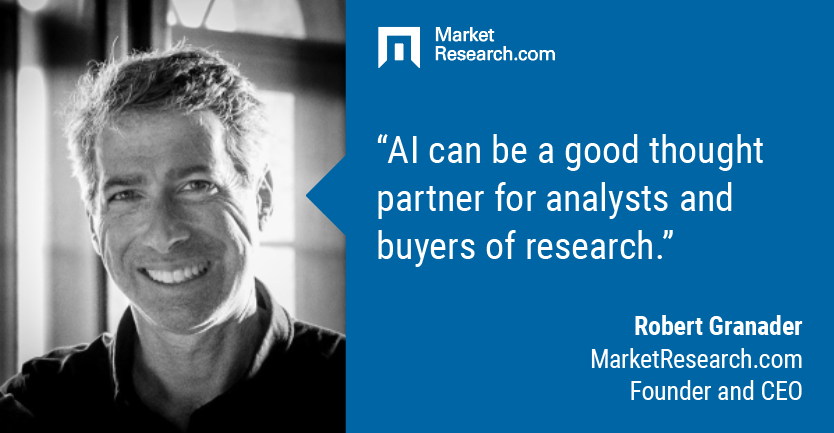 MarketResearch.com Founder and CEO, Robert Granader, successfully steered his company through a variety of industry transformations. Decades ago, he transitioned the business from a spiral-bound catalog selling printed reports to a global e-commerce website specializing in digital downloads.
MarketResearch.com Founder and CEO, Robert Granader, successfully steered his company through a variety of industry transformations. Decades ago, he transitioned the business from a spiral-bound catalog selling printed reports to a global e-commerce website specializing in digital downloads.
Now artificial intelligence is changing the game. Nothing since the dot-com bubble has triggered such fears and fantasies quite like the rise of AI.
I sat down with Robert to hear his perspective on how artificial intelligence will impact the market research industry and how to make the most of this new technology while avoiding its pitfalls.
Do you believe AI will radically change the market research industry?
AI is changing market research. Full stop. But market research has lots of sectors from primary to secondary, surveys and focus groups, to off-the-shelf reports. Regardless of where you sit in the market research world, AI is coming. It will change primary research, how we reach users, how we learn about companies, how we analyze secondary data, and the marketing strategies we use.
But there are pitfalls as well. Things like sourcing. The bottom line is you need to know the source of the data. For example, some of our market research reports draw on scanner data. That’s raw, hard data that’s real and necessary for answering the questions companies have, but AI can be helpful in analyzing that data and being a thought partner to researchers and end users.
Do you see AI as an opportunity or a threat?
Yes!
Every threat is also an opportunity. Artificial intelligence is not going to wipe out the need for market research. AI will change the way market research is produced and analyzed by users. AI will provide huge opportunities, but it will also change how we have done business in the past.
There are certainly threats associated with AI. Part of the threat is bad data, or unverified data, and that is going to be a real problem. We must be the gate keepers of real data vs. made-up data.
If bad data goes into an AI model initially, bad data will come out later. Generative AI builds on itself. Whatever data you put into it in the beginning will influence the results you get later. That’s because AI depends a lot on early users.
What key pain points can AI help solve when it comes to market research?
I think AI can be a good thought partner for analysts and for buyers of research. With AI, you can ask the research questions and interact with it in different ways. You can use AI to find data and pinpoint what you need faster, as opposed to searching through a big stack of information.
What are some of the main risks posed by AI?
Certainly fake data and “hallucinations.” When AI creates data that doesn’t come from a specific source, or the data is an inexact average based on unclear inputs, and we don’t know the context in which it makes decisions, that’s a problem.
Another risk is bad actors. If you are using an AI model that draws on data from a lot of different sources, and you don’t know what those sources are, people can put bad information in and you may not realize it.
If we produce a report, customers can come back and ask us how we came to a number, where it was sourced, but you can’t necessarily do that with many common AI tools, so how can you really rely on them?
The problem of unverifiable data is not new in the market research industry. It’s been an issue for years, but AI will take it a step further. AI can give you numbers faster, but you need to make sure they’re the right numbers.
How is MarketResearch.com incorporating AI into its offerings?
We will be using AI internally for our own uses and externally for our client’s uses. We’re revamping our search engines using cutting-edge AI features, such as semantic search, to help clients find data faster and get the answers they need without having to spend so much time on search.
In addition to enhancing our search engine, we’re creating an AI chatbot for a more interactive engagement with our reports. This tool will simplify the process of extracting information from our comprehensive reports, offering clients an alternative to PDFs. As part of our future plans, we’re considering the implementation of group chats. I foresee a scenario where our clients could engage with our research in their own Microsoft Teams channel, treating the research as an analyst in the chat for more dynamic discussions.
We are also using AI as a thought partner and to help with content creation, as well as marketing and sales. We will be analyzing our customer database to better predict the leading indicators that occur before a sale. We want to know what is it about a company that made them buy or not buy. Looking at these questions can create a virtuous cycle where we can identify patterns and adjust our approach.

About MarketResearch.com
MarketResearch.com is a leading provider of global market intelligence products and services. Originally known for offering the largest online collection of market research reports, we now offer a full suite of research solutions to help businesses of all sizes. Our global team of award-winning research specialists provide informed and objective advice to help you find the critical insights you need, whether that is in the form of a published report or data table, an on-going research subscription, or a custom research consulting project.








